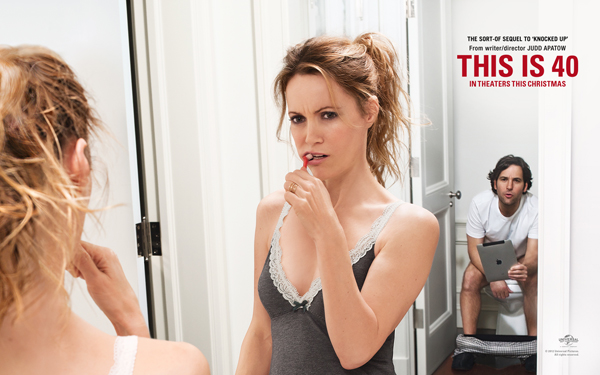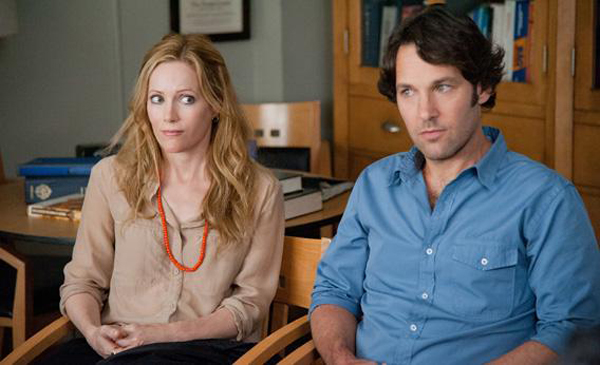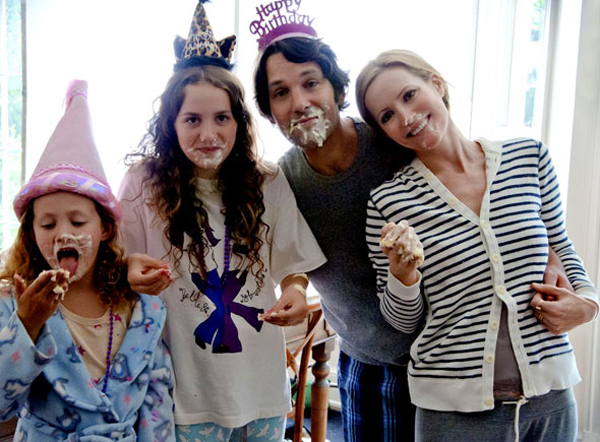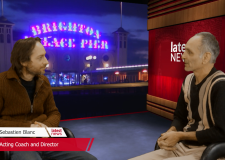Paul Rudd talks about his new film This Is 40

How would you describe the story?
There was always the hope that it would be funny but also painful and real and kind of capture what life is, which is funny and sad, angry, happy and all of those things that are, in a way, tough to classify. Somehow that resonates on some level as being believable and honest. Obviously, you want the story to be interesting and you want people to care about the characters, so that was always the goal.
When did Judd first mention this project to you?
It was a few years ago that Judd asked me what I thought about doing this movie. He had done Get Him To The Greek, which was a spinoff of Forgetting Sarah Marshall. I don’t know if that was the impetus for him to tell this story with the characters from Knocked Up. I think the subject matter was the idea that Judd came up with first, without the two characters. Then, I think he thought it should be those two characters from Knocked Up. When he talked about it to me at first, it was in broad strokes. It was an idea about what their life was like. Their kids are now older and they are navigating their way through their marriage. It was an exploration of that, of all the good and bad, as well as the struggles that they face. I thought that would be fun to do and interesting.
Did it strike a chord with you on a personal level?
Yes, I could certainly relate to the subject matter because I am married, although my kids are younger than Judd’s. The character that I play is the same age as I am, so there’s a lot that I understand and can bring to the role. I’ve never played the same character years later. That was also interesting.
What was that like, returning to play Pete again?
It was fun and easy. It isn’t like I needed a month to get into the skin and do some crazy preparation. It was cool and it wasn’t something that I thought would ever happen. I’m actually about to do it again in a few months with the Anchorman sequel.

In This Is 40, Pete is a man in crisis. His financial worries are dragging him down and that, in turn, puts his marriage and his family under pressure. What do you think the film is saying about family life?
I think that this family ultimately wants to be there for each other because they are a family. As mad as they might get with each other, they do love each other. That’s why I think the scene in the hotel where Debbie and Pete spend a night away from their kids is really crucial because you have to see that these two people really love each other. No one wants to see a movie about two people arguing the whole time. You have to understand why they are still together. No matter how mad you get with your significant other, there is still that bond. For example, there are the scenes with Melissa McCarthy, who plays a parent who accuses Debbie of threatening her son who has been rude to her daughter on Facebook. I’m going to come to my wife’s defense. I have her back and she’s got mine.
In This Is 40, is Judd writing a version of himself that you then play?
I think he wanted to make a movie about a couple that has been married for a while who are dealing with kids and parents, life, and turning forty. He is living that and we talked about that a lot. We did it with Knocked Up as well. We spent more time talking about it with This Is 40. We would get together and talk about what it’s like to be married and the things about our partners that drive us crazy. Our wives were very involved in this, too. The four of us spent a lot of time talking about it. I was actually kind of surprised at how forthcoming my wife and I were about things that could probably use some work in our marriage. Judd always says that some of it was me, some of it was him, and a lot of it was fiction. These are fictional characters. The stories are not either one of our lives, but there are things that are similar. I don’t know that I’m necessarily playing Judd, although it’s easy to make that assumption because I’m acting opposite his real wife and his real kids.
After Knocked Up, so many people said to me that they related to those characters, Pete and Debbie
Is there an honesty to which the audience can relate?
People who are married or in long-term relationships all deal with a lot of the same things. You ask yourself, “Is this person keeping me from realizing my fullest potential? Did I make the wrong choice? How can I be happy in the face of all of these struggles? Should it be this hard?” Husbands think that. Our wives think that. Everybody thinks a lot about the same stuff. After Knocked Up, so many people said to me that they related to those characters, Pete and Debbie, and that their dynamic and the things they were dealing with were very familiar. I think that we’re going to hear a lot of that from this film, too.
It’s interesting how Judd has used the music to illustrate the story and to show how Pete is losing his grip on his life. Could you relate to that?
Judd is so into music and always has been. It is interesting because Pete is at a point in his life where, for the first time, he doesn’t know what’s good. It isn’t about what’s popular. He could care less about that, but he hears something and he doesn’t know whether it’s good. For a character like Pete, that’s a huge thing. I can really relate to that. When I was in my 20s and 30s, I could hear a band and have a debate with absolutely anybody on earth and say this is why this band is good. I certainly hit a point in my life when I wasn’t listening to music as much and in the same way as I had several years ago. I have kids now, and I just don’t know music as well as I used to. When I was younger, I would read liner notes and I could tell you who produced what tracks on any album. I could tell you the musicians who played on every song. Now, I just don’t. The one thing that I could always count on and was a huge part of my identity was tied into music. Then, you hit a point in your life where you aren’t sure anymore and it’s scary and sad. It was always a great metaphor for where Pete was in his life.
Was Graham Parker a good sport to be part of the film in this way, kind of making fun of his own diminishing place in the music industry?
He is such a good sport. He understood the joke. He was selfless and didn’t put on any airs. He would say things like, “Well, that’s what it’s like. We’ll sell this many records and the next one will do worse.”
Is it nice that, as a result of the film, there’s a renewed interest in Graham Parker and The Rumour?
I hope so. I saw them play last night and they were incredible. They’ve been playing shows and I asked him how it was going. He is a straight-shooter and said that it’s been amazing. He told me it has been a lot of fun and that they’re so much better musically, maybe because they’ve been playing all these years. I went to see them and I knew what he meant. It was so tight, not forced and just great. It is very cool that this is happening to them. When we were shooting a scene in the movie where Graham plays with The Rumour again, it was the most surreal day for them. Their microphones were on when we were shooting. They took a bow and I don’t think they realized it, but they were giggling. One of the guys said, “Well, we made it to Hollywood, boys!” It was so strange and exciting for them. Their kids were there watching them. Graham’s daughter, who is in her twenties, and the son of another one of the guys in the band were there watching them play. They had never seen them play before. They grew up knowing about Graham Parker and The Rumour. They had the records and knew the songs and had heard the stories, but they had never seen their fathers play together until that day on set when they are on stage together. The dads were up there playing knowing that their kids were out their watching them for the first time. It was so moving and so cool.

When did you first meet Judd?
I first met him when I auditioned for Anchorman, but I had a relationship with the guy for a couple of years before that. I’d been at this dinner and the subject of fake names came up. I said that the best fake name was Gern Blanston, which is from a Steve Martin routine that he did and put on a record. I got into a discussion with these people deconstructing why Gern Blanston is so funny. Somebody there, an agent, said, “Oh, that explains Judd Apatow’s email address. I’ve always wondered about that.” I knew who Judd was and I went home that night and wrote to Gern Blanston at whatever the email address was at that time. I wrote, “Hey, nice pull on this very specific, arcane reference. It’s hilarious. Great email address.” He wrote me back. Then, for at least a year or two, we would email each other and kind of became pen pals although we had never met. When I finally met him, it was like, “Finally, it’s you!” Needless to say, we got along really well.
This Is 40 is out now in cinemas.





















